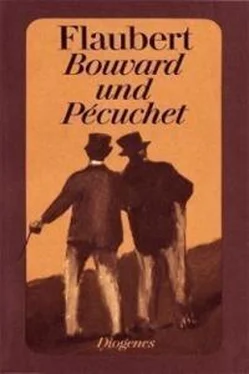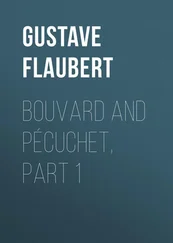This work of nature astonished them, and as they went on their way collecting shells, they started considerations as to the origin of the world.
Bouvard inclined towards Neptunism; Pécuchet, on the contrary, was a Plutonist.
"The central fire had broken the crust of the globe, heaved up the masses of earth, and made fissures. It is, as it were, an interior sea, which has its flow and ebb, its tempests; a thin film separates us from it. We could not sleep if we thought of all that is under our heels. However, the central fire diminishes, and the sun grows more feeble, so much so that one day the earth will perish of refrigeration. It will become sterile; all the wood and all the coal will be converted into carbonic acid, and no life can subsist there."
"We haven't come to that yet," said Bouvard.
"Let us expect it," returned Pécuchet.
No matter, this end of the world, far away as it might be, made them gloomy; and, side by side, they walked in silence over the shingles.
The cliff, perpendicular, a mass of white, striped with black here and there by lines of flint, stretched towards the horizon like the curve of a rampart five leagues wide. An east wind, bitter and cold, was blowing; the sky was grey; the sea greenish and, as it were, swollen. From the highest points of rocks birds took wing, wheeled round, and speedily re–entered their hiding places. Sometimes a stone, getting loosened, would rebound from one place to another before reaching them.
Pécuchet continued his reflections aloud:
"Unless the earth should be destroyed by a cataclysm! We do not know the length of our period. The central fire has only to overflow."
"However, it is diminishing."
"That does not prevent its explosions from having produced the Julia Island, Monte Nuovo, and many others."
Bouvard remembered having read these details in Bertrand.
"But such catastrophes do not happen in Europe."
"A thousand pardons! Witness that of Lisbon. As for our own countries, the coal–mines and the firestone useful for war are numerous, and may very well, when decomposing, form the mouths of volcanoes. Moreover, the volcanoes always burst near the sea."
Bouvard cast his eyes over the waves, and fancied he could distinguish in the distance a volume of smoke ascending to the sky.
"Since the Julia Island," returned Pécuchet, "has disappeared, the fragments of the earth formed by the same cause will perhaps have the same fate. An islet in the Archipelago is as important as Normandy and even as Europe."
Bouvard imagined Europe swallowed up in an abyss.
"Admit," said Pécuchet, "that an earthquake takes place under the British Channel: the waters rush into the Atlantic; the coasts of France and England, tottering on their bases, bend forward and reunite—and there you are! The entire space between is wiped out."
Instead of answering, Bouvard began walking so quickly that he was soon a hundred paces away from Pécuchet. Being alone, the idea of a cataclysm disturbed him. He had eaten nothing since morning; his temples were throbbing. All at once the soil appeared to him to be shaking, and the cliff over his head to be bending forward at its summit. At that moment a shower of gravel rolled down from the top of it. Pécuchet observed him scampering off wildly, understood his fright, and cried from a distance:
"Stop! stop! The period is not completed!"
And in order to overtake him he made enormous bounds with the aid of his tourist's stick, all the while shouting out:
"The period is not completed! The period is not completed!"
Bouvard, in a mad state, kept running without stopping. The many–branched umbrella fell down, the skirts of his coat were flying, the knapsack was tossing on his back. He was like a tortoise with wings about to gallop amongst the rocks. One bigger than the rest concealed him from view.
Pécuchet reached the spot out of breath, saw nobody, then returned in order to gain the fields through a defile, which Bouvard, no doubt, had taken.
This narrow ascent was cut by four great steps in the cliff, as lofty as the heights of two men, and glittering like polished alabaster.
At an elevation of fifty feet Pécuchet wished to descend; but as the sea was dashing against him in front, he set about clambering up further. At the second turning, when he beheld the empty space, terror froze him. As he approached the third, his legs were becoming weak. Volumes of air vibrated around him, a cramp gripped his epigastrium; he sat down on the ground, with eyes closed, no longer having consciousness of aught save the beatings of his own heart, which were suffocating him; then he flung his tourist's stick on the ground, and on his hands and knees resumed his ascent. But the three hammers attached to his belt began to press against his stomach; the stones with which he had crammed his pockets knocked against his sides; the peak of his cap blinded him; the wind increased in violence. At length he reached the upper ground, and there found Bouvard, who had ascended higher through a less difficult defile. A cart picked them up. They forgot all about Étretat.
The next evening, at Havre, while waiting for the packet–boat, they saw at the tail–end of a newspaper, a short scientific essay headed, "On the Teaching of Geology." This article, full of facts, explained the subject as it was understood at the period.
"There has never been a complete cataclysm of the globe, but the same space has not always the same duration, and is exhausted more quickly in one place than in another. Lands of the same age contain different fossils, just as depositaries very far distant from each other enclose similar ones. The ferns of former times are identical with the ferns of to–day. Many contemporary zoophytes are found again in the most ancient layers. To sum up, actual modifications explain former convulsions. The same causes are always in operation; Nature does not proceed by leaps; and the periods, Brogniart asserts, are, after all, only abstractions."
Cuvier's work up to this time had appeared to them surrounded with the glory of an aureola at the summit of an incontestable science. It was sapped. Creation had no longer the same discipline, and their respect for this great man diminished.
From biographies and extracts they learned something of the doctrines of Lamarck and Geoffroy Saint–Hilaire.
All that was contrary to accepted ideas, the authority of the Church.
Bouvard experienced relief as if from a broken yoke. "I should like to see now what answer Citizen Jeufroy would make to me about the Deluge!"
They found him in his little garden, where he was awaiting the members of the vestry, who were to meet presently with a view to the purchase of a chasuble.
"These gentlemen wish for―?"
"An explanation, if you please."
And Bouvard began, "What means, in Genesis, 'The abyss which was broken up,' and 'The cataracts of heaven?' For an abyss does not get broken up, and heaven has no cataracts."
The abbé closed his eyelids, then replied that it was always necessary to distinguish between the sense and the letter. Things which shock you at first, turn out right when they are sifted.
"Very well, but how do you explain the rain which passed over the highest mountains—those that are two leagues in height. Just think of it! Two leagues!—a depth of water that makes two leagues!"
And the mayor, coming up, added:
"Bless my soul! What a bath!"
"Admit," said Bouvard, "that Moses exaggerates like the devil."
The curé had read Bonald, and answered:
"I am ignorant of his motives; it was, no doubt, to inspire a salutary fear in the people of whom he was the leader."
"Finally, this mass of water—where did it come from?"
"How do I know? The air was changed into water, just as happens every day."
Читать дальше








![Гюстав Флобер - Закат Карфагена [Сборник]](/books/414440/gyustav-flober-zakat-karfagena-sbornik-thumb.webp)


